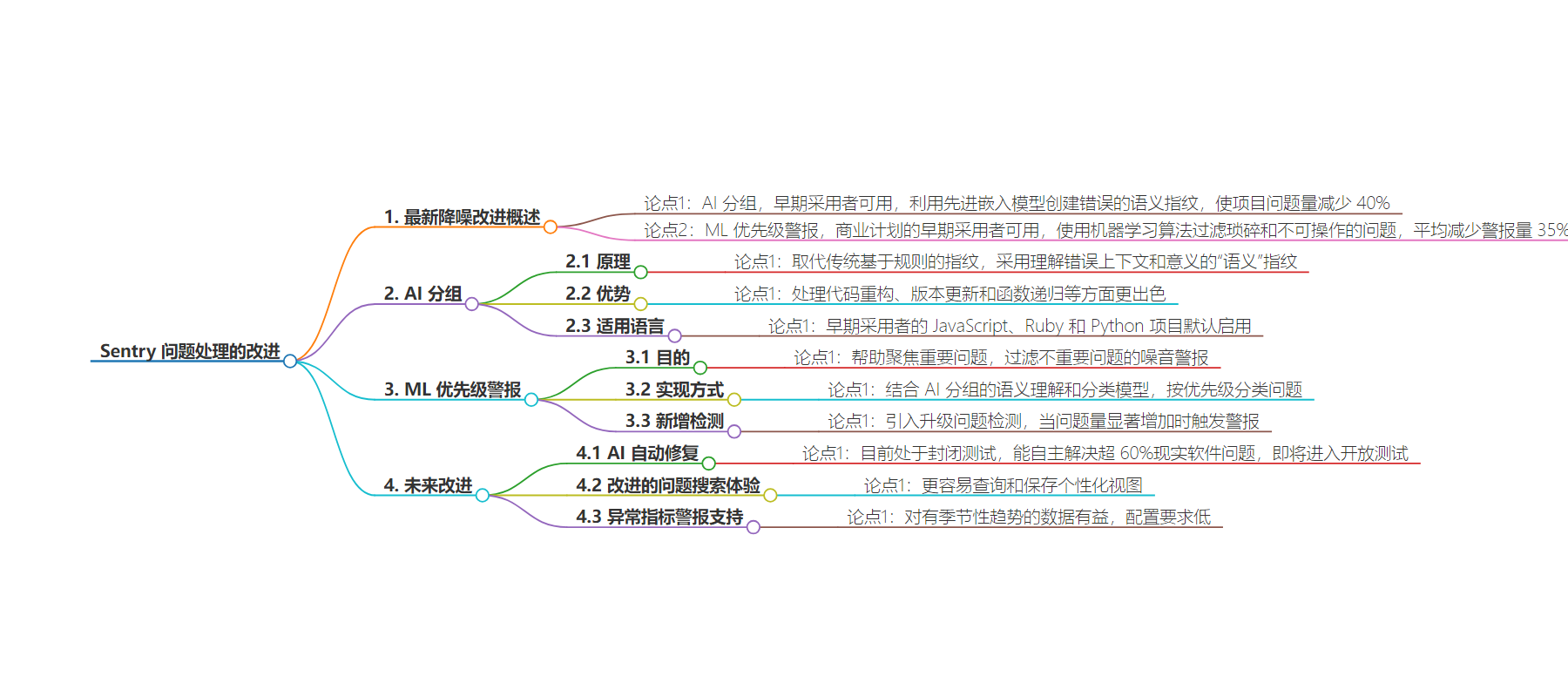包阅导读总结
1. 关键词:`NoiseReduce`、`AI Grouping`、`ML Priority Alerts`、`Issue Creation`、`Alert Fatigue`
2. 总结:文本主要介绍了对 Issues 体验的降噪改进,包括 AI Grouping 和 ML Priority Alerts 两个新功能,前者改善了问题创建,后者解决了警报疲劳,还提及更多改进正在进行中,如 AI Autofix 等。
3. 主要内容:
– 最新噪音减少改进的快速总结
– AI Grouping:早期采用者可用,利用高级嵌入模型创建错误的语义指纹,显著改善问题创建,减少 40%的问题量,目前在 JavaScript、Ruby 和 Python 项目中默认启用。
– ML Priority Alerts:商业计划的早期采用者可用,使用机器学习算法过滤琐碎和不可操作的问题,减少 35%的警报量。
– 更多改进即将到来
– AI Autofix:在封闭测试中已能自主解决超 60%的软件问题,即将进入公开测试。
– 改进的问题搜索体验,即将支持基于异常的指标警报。
– 其他生活质量增强,如从指标警报中删除存档问题等。
思维导图:
文章地址:https://blog.sentry.io/cancel-the-issue-noise/
文章来源:blog.sentry.io
作者:Sentry Blog
发布时间:2024/8/14 0:00
语言:英文
总字数:712字
预计阅读时间:3分钟
评分:87分
标签:错误监控,AI 分组,机器学习优先级警报,Sentry,JavaScript
以下为原文内容
本内容来源于用户推荐转载,旨在分享知识与观点,如有侵权请联系删除 联系邮箱 media@ilingban.com
Cancel the (Issue) Noise

For those who like to get straight to the point, here’s a quick summary of the latest noise-reducing improvements to the Issues experience:
-
AI Grouping – available for early adopters, this feature significantly improves issue creation by leveraging advanced embeddings models to create semantic fingerprints of errors. Early results show a 40% reduction in issue volume for projects that have enabled this feature.
-
ML Priority Alerts – available to early adopters on the Business Plan, this feature uses a machine learning algorithm to filter out trivial and unactionable problems, reducing alert volume by an average of 35%.
We’re feeling pretty good about these features. Might even go out on a limb and say they’re some of the most significant improvements to our error grouping and alerts ever. Need more convincing? Keep reading.
AI Grouping: Smarter, More Effective Issue Creation
Sentry has historically relied solely on heuristics-based fingerprinting to aggregate errors into issues. The complexity of modern JavaScript and new frameworks reduces the effectiveness of this approach. With the introduction of AI Grouping, we’ve taken a major step forward in reducing duplicate and single-event issues.
AI Grouping replaces traditional, rule-based fingerprints with “semantic” fingerprints, crafted by a model that understands the context and meaning behind errors.
This model creates a detailed representation of each issue, allowing it to intelligently determine whether new errors stem from the same underlying problem. This approach excels in handling the nuances of code refactors, version updates, and function recursion, areas where static heuristics can fall short.
Different python versions used to create unnecessary new groups; this is solved with AI Grouping
Currently, AI Grouping is enabled by default for early adopters with JavaScript, Ruby, and Python projects. If you’re interested in trying it out, simply head to your organization settings page and toggle the Early Adopter switch.
ML Priority Alerts: Focus on What Really Matters
Alert fatigue is real, especially in large, complex projects. While AI Grouping improves how we create issues, the fact that Sentry’s default alert rules notify on every new issue created means that you will get alerts for everything – including the debug and info-level issues that don’t need to be addressed right away. ML Priority Alerts is designed to help you focus on the issues that matter by filtering out noisy alerts stemming from less important issues.
This feature integrates AI Grouping’s semantic understanding of an issue with a classification model that identifies non-actionable or low-priority errors. Since issues are now classified into different priority levels, the updated default alert rule with priority-based conditions enables us to proactively filter out low-priority issues from triggering alerts. To ensure that minor issues don’t escalate into major problems, we’ve also introduced Escalating Issues detection, which triggers alerts when significant spikes in issue volume are detected.
More Coming Soon
AI Grouping and ML Priority Alerts are just the beginning. We’ve been hard at work making improvements across the board, many of which are already live with more on the way.
From quality-of-life enhancements like removing archived issues from metric alerts to defaulting on new Inbound Filters to help cut down on the noise in frontend projects, we are making sure you and your team can easily fix the critical problems first. That said, we’re working on a few more capabilities you might not hate:
- AI Autofix, currently in closed beta, AI Autofix has shown significant progress since its initial announcement. It’s already capable of autonomously resolving over 60% of real-world software issues, and we’re gearing up to move into open beta soon
- A revamped issues search experience, making it easier than ever to query for the issues you care about and save individualized views for easy access
- In addition to static and % change metric alerts, Sentry will soon support anomaly-based metric alerts. This detection methodology is particularly beneficial for data with seasonal trends and requires minimal configuration
We’re actively working on these features and a few more. If you want to live on the edge, we can turn some of them on for you sooner rather than later. Find us on Discord, and let us know what you’re interested in or what you think of the improvements.
